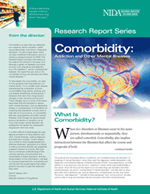Many individuals who abuse drugs also have other mental disorders. NIDA's latest Research Report describes the co-occurrence, or comorbidity, of substance use disorders and other psychiatric disorders such as attention-deficit hyperactivity disorder (ADHD), schizophrenia, and depression.

Drug addiction is a brain disease "characterized by compulsive, at times uncontrollable drug craving, seeking, and use despite devastating consequences—behaviors that stem from drug-induced changes in brain structure and function. These changes occur in some of the same brain areas that are disrupted in various other mental disorders," writes Dr. Nora D. Volkow in the introduction to the report, Comorbidity: Addiction and Other Mental Illnesses. "Even though we cannot always prove a connection or causality, we do know that certain mental disorders are established risk factors for subsequent drug abuse—and vice versa."
Surveys show high rates of substance use disorders among people with mental illness. People diagnosed with a mood or anxiety disorder are about twice as likely as others to abuse drugs, and people with schizophrenia have higher rates of tobacco and alcohol use disorders than the general population. For example, 41 percent of mentally ill respondents to the 1991-1992 National Comorbidity Survey said they were current smokers, almost double the rate of those with no mental illness. Other studies indicate that as many as 90 percent of people with schizophrenia smoke.
People who abuse drugs also have high rates of mental illness. By some estimates, about 60 percent of people with drug use disorders have been diagnosed with another mental disorder. A recent clinic-based study of 865 substance abusers found that 66 percent had at least one co-occurring mental disorder (see "Recovery Checkup System Helps Substance Abusers Who Have Mental Disorders").
The high prevalence of comorbid substance use and other mental disorders does not necessarily indicate that one condition causes the other. According to the report, there are at least three possible explanations for such co-occurring diagnoses:
- Drug abuse may be a risk factor for one or more symptoms of another mental illness. The increased risk of psychosis in some marijuana abusers has been offered as evidence supporting this possibility.
- Some individuals with mental disorders use drugs as a form of self-medication. A common example of this hypothesis is the use of tobacco products by patients with schizophrenia. The nicotine in tobacco may diminish symptoms of the disease, improve cognition, or decrease the side effects of medications.
- Drug abuse and other mental disorders are both caused by common factors, such as underlying brain deficits and early exposure to stress or trauma. For example, brain circuits that use dopamine are typically affected by addictive substances and may also be involved in depression, schizophrenia, and other psychiatric disorders.
All three scenarios are likely to contribute, in varying degrees, to the establishment and expression of specific comorbidity pairings.
Developmental Factors
There is evidence suggesting that early drug use may be a risk factor for the later occurrence of mental illness. The link may hinge upon genetic vulnerability, psychosocial experiences, or a person's environment. Having a mental disorder in childhood or adolescence also increases the risk of drug abuse.
Numerous studies have documented an increased risk for drug use disorders in youth with untreated ADHD; some of these studies suggest that only a subset of these young people—those with co-occurring conduct disorders—are vulnerable. Treatment with stimulants reduces ADHD symptoms and may also reduce the associated risk of drug abuse.
The report stresses the importance of careful and accurate diagnosis and treatment of each disorder. It gives examples of medications and behavioral therapies that have been successful and others that show promise in treating co-occurring disorders.
